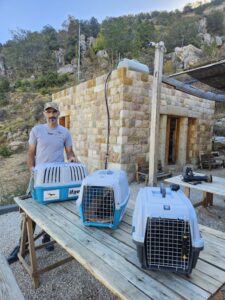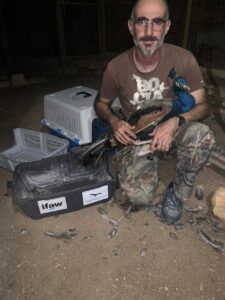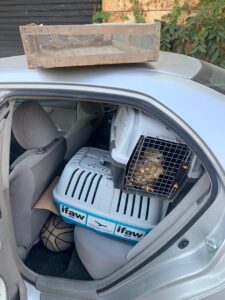
Animal rescuers in Lebanon are facing significant challenges as they work to save animals trapped in war-torn zones. Their efforts offer a lifeline to the often-overlooked victims of war as many families forced to flee have had to leave pets behind, leading to a growing number of animals left vulnerable to hunger, fear, injury or death.
As conflict spills into Lebanon, animals caught near the frontlines are facing unimaginable hardship. Trapped amid explosions and chaos, these animals have no means to find safety alone and urgently need rescuing.
With limited resources and escalating dangers, these animals are struggling to survive and rely on human compassion and support to find relief amid the displacement crisis caused by the war.

Challenges
Not only are rescuers they facing logistical difficulties, like restricted access to areas due to damaged roads and infrastructure, but they are also facing difficulties in finding and reaching the animals. Financial constraints are also severe, as funds for food, medical supplies, and shelter are scarce and transportation cost is a significant burden.
Additionally, safety risks are constant, with rescuers venturing into dangerous areas where shelling and violence are ongoing. Despite these obstacles, many volunteers remain committed to protecting Lebanon’s vulnerable animal population amid the chaos.
For the animals left behind, war brings fear, hunger, abandonment, and sometimes death.
Dr Michel Sawan, who is an expert in biodiversity and birds, and head of the Lebanese Association for Migratory Birds explained NOW: “Both wild animals and domestic animals are in a critical situation as many pets have been left alone and died, some have been let free by their owners but have died on the roads and in terms of pets like cats and dogs, some have been kept tied and have died either from hunger or thirst and sometimes from attacks.”
Countless pets and animals are being left behind by families forced to flee on short notice, often with only the essentials they can carry.
“Some families have put their pets for adoptions and have tried to sell them but rarely anyone is buying because of the current situation,” said Dr Michel.
According to Dr Michel, Lebanon lacks a disaster plan which includes pet-boarding facilities. His association is working on projects in coordination with IFAW (International Funds of Animal Welfare) and has lately started working on pet-boarding services.
The sudden evacuations meant that many families have left pets, birds and livestock stranded in dangerous and bombarded areas. Without regular food or water, these animals are left vulnerable to hunger, dehydration, and the trauma of constant violence.
Many are also wandering through empty streets or hiding in abandoned buildings, whilst many are still under the rubble.
Birds in Lebanon are facing devastating impacts from the ongoing war, with many dying from the sheer shock of sonic booms and explosions.
These loud, sudden sounds send a shockwave through their small systems, causing their heart rates to spike with adrenaline. For many birds, this extreme stress response can be fatal, leading to sudden death from heart failure, explained Dr Michel.
Birds in shelters and pet shops are especially vulnerable, as they are unable to escape to safer locations so some have died in cages as attacks shattered through structures meant to protect them.

Efforts by volunteers on the ground
According to Local animal rescue groups and volunteers, animals stranded in war-torn areas are in desperate need of emergency food, water and medical care.
While civil defence members were searching through rubble for human victims or survivors, members of Animals Lebanon, an animal protection organization, were also rushing to scenes in Beiruts Dahye, or South Lebanon to rescue animals like cats or dogs.
Despite the growing number of animals in need, shelters are overcrowded and underfunded, with little space to accommodate more rescues.
These dedicated rescuers work alongside emergency responders, ensuring that pets and stray animals caught in the destruction receive the help they need.
Jessica, an animal rights activist and rescuer from BETA (Beirut for the Ethical Treatment of Animals) has told NOW: “Our team has been focused intensely on the southern region and Beirut’s Dahye these past weeks, rescuing as many animals as possible, providing urgent medical care, transporting them to safety, and ensuring they have shelter.”
The activist added: “We’ve been preparing for months, stockpiling medical supplies, daily essentials, fuel for our generators, and, most importantly, enough food to sustain our shelter animals in case of a prolonged siege. We are doing everything we can to be ready for whatever comes.”
Shelters are at full capacity and with flights being cancelled, many scheduled adoptions abroad have been postponed.
With budgets stretched thin, animal rescue efforts, whether organized by formal organizations or individual volunteers are heavily reliant on donations from charitable projects and individual supporters.
Lebanon was already facing a significant challenge, with the increasing number of stray animals, particularly dogs and cats. This was made worse by the country’s economic crisis and a lack of comprehensive animal welfare laws and insufficient resources for animal shelters.









